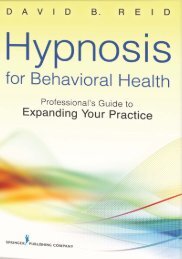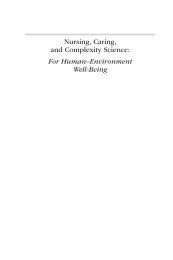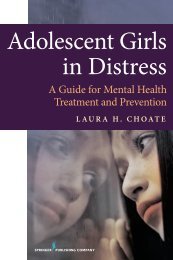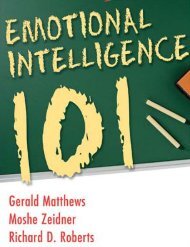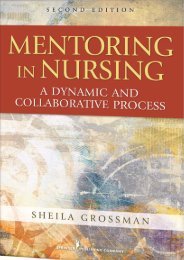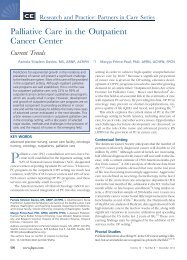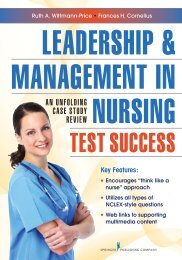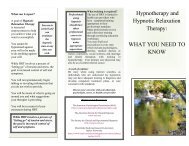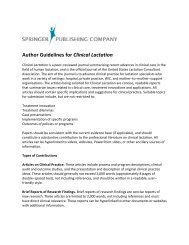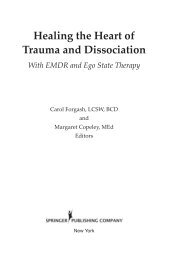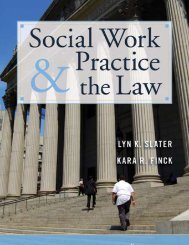Expertise in nursing practice : caring, clinical judgment - Springer ...
Expertise in nursing practice : caring, clinical judgment - Springer ...
Expertise in nursing practice : caring, clinical judgment - Springer ...
Create successful ePaper yourself
Turn your PDF publications into a flip-book with our unique Google optimized e-Paper software.
Chapter 1 The Relationship of Theory and Practice <strong>in</strong> the Acquisition of Skill 3<br />
piety—angrily reject<strong>in</strong>g Euthyphro’s appeal toexamples and his own special<br />
<strong>in</strong>tuition.<br />
Descartes (1641/1960) and Kant (1963) completed the Socratic account<br />
of theory by add<strong>in</strong>g two more requirements: (4) Discreteness. A<br />
theory must be stated<strong>in</strong>terms of elements free of context, whichwe now<br />
call features,factors, attributes, data po<strong>in</strong>ts,cues, and soforth—isolable<br />
elements that make no reference to human <strong>in</strong>terests, traditions, <strong>in</strong>stitutions,<br />
and such. (5) Systematicity. Atheory must be anewwhole <strong>in</strong> which<br />
decontextualized elements are related toeach otherbyrules or laws.<br />
Plato expressed all five characteristics <strong>in</strong>the myth of the cave: The<br />
theorist must remove his object of knowledge from theeveryday, perceptual,<br />
social world <strong>in</strong> order to see the universal relations between the<br />
explicit and abstract elements—<strong>in</strong> this case, the ideas. Freed from all<br />
context, the elements form a system of their own—all Plato’s ideas are<br />
organized bythe idea of the Good. Plato saw that while everyday understand<strong>in</strong>g<br />
is implicit, concrete, local, holistic, and partial, theories, by<br />
contrast, are explicit, abstract, universal, and range over elements organized<br />
<strong>in</strong>to anew total whole.<br />
Another question be<strong>in</strong>g asked was what do these new theoretical<br />
discipl<strong>in</strong>es have to do with everyday <strong>practice</strong>. In answer<strong>in</strong>g this question,<br />
thefavoriteexample was medic<strong>in</strong>e. Unlike physics, astronomy, and<br />
geometry, which were purely abstract, Hippocrates claimed to have a<br />
theory that told physicians what to do.For this reason, Socrates admired<br />
Hippocrates and held up the newmedic<strong>in</strong>e as a model of knowledgefor<br />
philosophers to study. Hippocratesreturnedthecompliment by remark<strong>in</strong>g<br />
that “a philosophical physician resembles agod.” The question for<br />
Socrates thus became, Howisatheory-based craft like medic<strong>in</strong>e different<br />
from skills based on rules of thumb like stonecutt<strong>in</strong>g and cook<strong>in</strong>g? His<br />
answer, which still has serious consequences for our current lives, grew<br />
out of two observations. Both were true observations about medic<strong>in</strong>e,<br />
but, like agood philosopher, Socrates overgeneralizedthem. He saw that<br />
physicians claimed to be able to expla<strong>in</strong> why they did what they did and<br />
that their explanations were based on pr<strong>in</strong>ciples from whichthe behavior<br />
<strong>in</strong> question could be seen tofollow rationally. Generaliz<strong>in</strong>g these observations,<br />
Socrates claims <strong>in</strong> Gorgias (Plato, 1937) that any craft must have<br />
“pr<strong>in</strong>ciples of action and reason” (p. 501a).<br />
Theclaim that a craft or techne must be based onatheory that could<br />
be articulatedbythe practitioners ledSocratesto ruleout of account all<br />
forms of <strong>in</strong>tuitiveexpertise that do notseemto be based on any pr<strong>in</strong>ciples<br />
at all. Cook<strong>in</strong>g, for example, unlike medic<strong>in</strong>e, is “unable to render any



